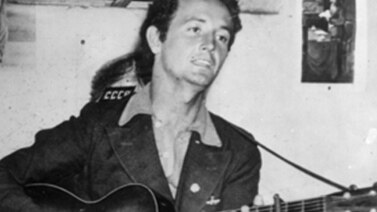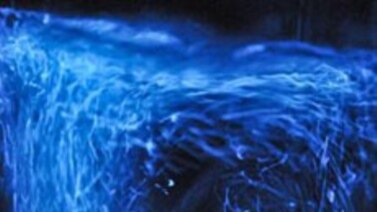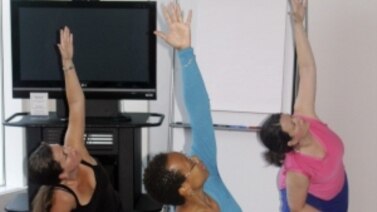BARBARA KLEIN: Welcome to THIS IS AMERICA in VOA Special English. I’m Barbara Klein.
CHRISTOPHER CRUISE: And I’m Christopher Cruise. This week on our program, we tell you about an unusual advertising campaign called "Geek the Library." Plus, we learn about a music education program in New York and a science education program in Vermont.
(MUSIC)
BARBARA KLEIN: Lisa Purcell likes to make science fun for schoolchildren and adults. Here she is, training adult volunteers how to teach kids about owls.
LISA PURCELL: "Hooh-hoo-hooh-hooo. Hoooohoooooo! So try it again."
VOLUNTEERS: "Hooh-hoo-hooh-hoo. Hoooohoooooo!"
Lisa Purcell worked for years at the Vermont Institute of Natural Science. But then she and several others from the institute decided to create their own way to support community-based science education.
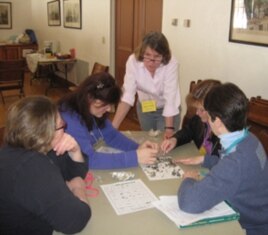
In two thousand six they started the Four Winds Nature Institute. Four Winds has one thousand five hundred volunteers in four states in the Northeast.
CHRISTOPHER CRUISE: Science educators say hands-on study of natural science often gets less attention in schools than it should. Schools can pay Four Winds to provide training for adults who want to share their interest in nature with children. Lisa Purcell says the programs might include, for example, a puppet show.
LISA PURCELL: "We know that we want kids to be learning hands-on. We know we want them to be making discoveries in their own backyard. We’d love it to be something that probably they’ve walked by without noticing it. And then we start thinking about how we’ll get kids excited about that. What will the puppet show need to include for students to understand the life of a goldenrod gallfly, for example?”
BARBARA KLEIN: Kelli Bates, a teacher in Chittenden, Vermont, says the programs are popular with students.
KELLI BATES: "One year we were doing something with trees and the kids were actually parts of the tree. Some would be the trunk, and then kids were actually laying on the floor being the roots. And things like that kind of connect science theories in a way that they can understand.”
One afternoon a month, Lisa Purcell does science activities with first graders.
(SOUND)
She explains that owls eat things whole, then spit up pellets filled with whatever they could not digest. She has the students examine clean owl pellets ordered from a website.
LISA PURCELL: "And then in teams of two -- no, they're very clean, look."
CHILDREN: "Oooh!"
LISA PURCELL: "They don't smell bad or anything. We’re going to very carefully pull these apart, OK?"
Seven-year-olds Gracie Stahura and Sophia Husack are looking at the remains of a very small animal, a vole, that they found in a pellet.
GRACIE STAHURA AND SOPHIA HUSACK: "Do you see those teeth? It’s so cool. I never knew about the pellets. We have a big yard and there’s woods all around us, and I’m going to look under the trees, so if I find them I’m going to get some toothpicks and open it."
Lisa Purcell looks at Gracie and Sophia and smiles a big smile at their excitement about science.
(MUSIC)
BARBARA KLEIN: Public libraries are an important part of American communities. But public services are facing budget cuts as many communities struggle to recover after the recession. Now libraries are hoping to get more attention, and more money, with an unusual advertising campaign.
Paula Baxter is director of the Rutland Free Library in Rutland, Vermont.
PAULA BAXTER: "For this library, we've run at a deficit for the last two years, and next year we're looking at a larger deficit amount."
Paula Baxter says people still come to the library to borrow books and movies. But now they can also download e-books. And they can find electronic resources to help with things like homework or finding a job. Yet many people have a common reaction to all of the services that the library offers.
PAULA BAXTER: "The eyes light up and click. It happens -- 'I didn't know you had this.'"
CHRISTOPHER CRUISE: Jenny Johnson is the executive director of marketing for the Online Computer Library Center.
JENNY JOHNSON: "We believed from the get-go that it couldn't be something as you know -- pictures of kids in libraries reading books and 'Isn't this lovely'? We knew from the research that we had to get people to think differently about the library."
The center is a nonprofit organization that helps libraries around the world. Ms. Johnson says there have been a lot of marketing campaigns to increase the use of libraries, but not to increase the funding of libraries.
The Online Computer Library Center set out to change that with six million dollars from the Bill and Melinda Gates Foundation.
BARBARA KLEIN: The center hired the advertising company Leo Burnett.
Charley Wickham was part of the team that looked for a way to change the image of libraries.
CHARLEY WICKHAM: "Oh, a library, it’s that quiet place and the newspapers are on those long wooden poles, and there’s rows and rows of books. And whatever -- they kind of have this thing in their mind."
The result: a campaign called "Geek the Library." In the past, people might have taken offense if someone called them a geek. It meant a person who knew more about books or computers than how to talk to other people. But Charley Wickham says this term is now used with pride.
CHARLEY WICKHAM: "You might put geek and library together -- as yeah, the library’s a place where, like, geeky people go. But when we broke that mental synapse and said 'No, no, no, the library is a place for cool people to go and get their geek on,' and that's the thing that made it jump off billboards, that's the thing made it jump out of posters. That's the thing that made it change the way people thought about the library, and it got the really quick reaction."
CHRISTOPHER CRUISE: There are several "Geek the Library" posters at the library in Proctor, Vermont, where Lisa Miser is a librarian.
LISA MISER: "It’s always exciting when someone takes a word like geek and turns it into a verb."
One says "I Geek Mythology." Another shows the smiling face of a boy who "geeks" worms.
LISA MISER: "Growing up in the eighties, geek was kind of, you know -- we know what geek was. But for someone to say 'Hey, that word can be hip,' there's something very cool about that. The faces, the way the posters are done. And I think it’s cool to lots of different people, and that's what you want to do, is you want to hit everybody."
Rutland library director Paula Baker says she hopes the attention will get voters to write to local officials. And she knows what she wants them to say.
PAULA BAKER: "We need more hours from that library. We need more children's programs from our library, and we want you to do something about it."
Administrators at the Rutland library made posters with well-known local people. One library user, Malaina Elliott, liked a poster showing a school official who "geeks" penguins.
MALAINA ELLIOTT: "It gets your attention. You're like, 'Geek what? I'm sorry, excuse me?' It's really neat. I think it's great the library is pushing so hard to get people back."
(MUSIC)
BARBARA KLEIN: Carnegie Hall and the Juilliard School in New York City have a training program for young musicians called the Academy. The program is designed to help classical musicians build their careers. Nathan Schram plays the viola. He was a year out of university when he joined the Academy as a fellow last October.
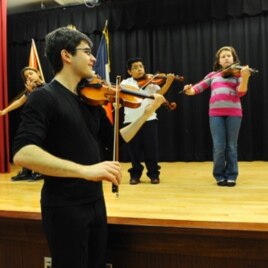
Half the time, fellows perform in concerts around the city. During the other half, they teach in public schools. Nathan Schram was sent to PS 75, an elementary school in Brooklyn.
Last October, he told VOA how he felt about receiving an invitation to join the Academy.
NATHAN SCHRAM: "It sounded like it was going to help me communicate better with audiences. I was going to find a newer audience. I was going to help people that might otherwise not be able to experience this music and maybe I could learn something from them, too."
CHRISTOPHER CRUISE: In May, he looked back at the school year that was coming to a close.
NATHAN SCHRAM: "Well, the novelty of me coming here has worn off a little bit. But it's great. It’s nice coming in here and building a relationship, seeing the kids that may be struggling one week all of a sudden are really doing incredibly well the next week."
(SOUND)
He and Zelman Bokser, the school's violin teacher, were helping students prepare for the famous Carnegie Hall.
NATHAN SCHRAM: "So they’re going to be playing Beethoven’s Ninth Symphony! An arrangement, a little bit of a simplified version of it, where they’re going to be doing 'Ode to Joy' with the Orchestra of St. Luke’s."
Mr. Bokser says the students had to learn seven new pieces of music in just five weeks to perform at Carnegie Hall.
ZELMAN BOKSER: "None of it, for this particular group, none of it is a stretch, technically. But learning so much of it in such a short time, that’s a big scramble -- and they have to know it from memory."
BARBARA KLEIN: The students, including this fourth-grader, were excited for the big day.
PETAL JADEO: "My name is Petal Jadeo and I was really surprised, because we never, ever, ever been to play to Carnegie Hall in our lives!"
One week later, she and her classmates were there. The students wore new T-shirts. They shared the stage with the Orchestra of St. Luke’s and other schoolchildren.
(SOUND)
Carnegie Hall was filled with students from all over the area.
(SOUND)
Afterward, the students from PS 75 went to Central Park to eat some lunch and talk about the concert.
LIZBETH NUNEZ: "Hi, my name is Lizbeth Nunez. And I felt very excited, but when I was looking at the people I was like "Whoa!" More than a thousand or one thousand five hundred people were there all day.”
CHRISTOPHER CRUISE: A week later, the school year was over, and it was time for Nathan Schram to say goodbye to his students.
NATHAN SCHRAM: "I just had my last teaching day today and it was, certainly, bittersweet. It was definitely, hands down, the hardest part of the program."
Throughout the year, as a fellow of the Academy, Nathan Schram got the chance to perform in many different places in New York. And he got the chance to perform with some of the biggest names in classical music. But, unlike his students, he never appeared in the main auditorium at Carnegie Hall. Nathan plans to keep working on that goal when he completes the second year of his fellowship with the children at PS 75 in Brooklyn.
(MUSIC)
BARBARA KLEIN: You can find transcripts, MP3s and podcasts of our programs at voaspecialenglish.com. I'm Barbara Klein with Christopher Cruise, who wrote today's show with reporting by Nina Keck in Vermont and Jeff Lunden in New York.
CHRISTOPHER CRUISE: Join us again next week for THIS IS AMERICA in VOA Special English.
